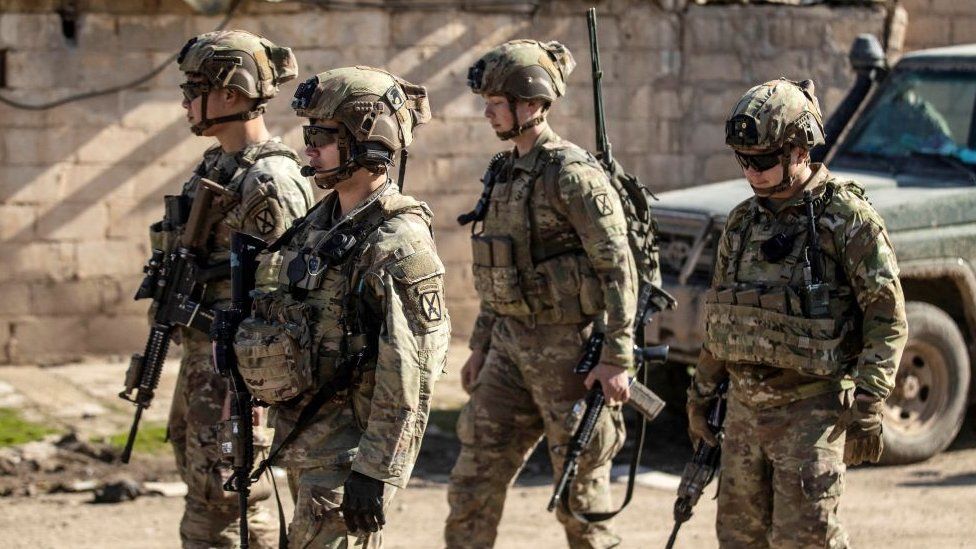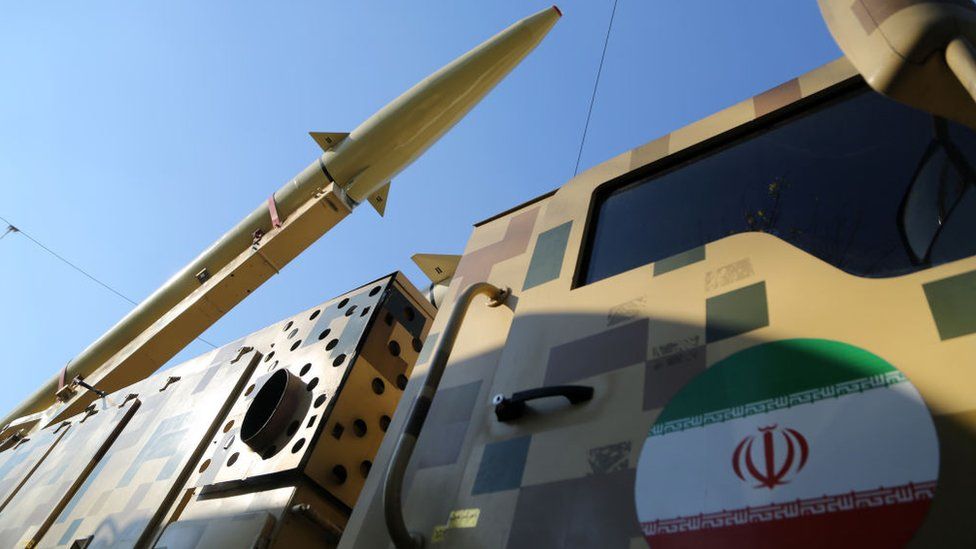Foreign policy experts said the approach may be calculated to avoid escalating a conflict with Iran.
 Image source, Getty Images
Image source, Getty ImagesNearly a week after a drone strike in Jordan killed three US soldiers, retaliatory strikes against Iran-backed militias have begun.
The strikes had been expected for several days, and in the interim, the Biden administration began to face questions and criticism from Republicans about the timing and forcefulness of the US response.
But foreign policy experts believed the approach allowed Iran to withdraw personnel, potentially avoiding a wider conflict between the US and Iran.
“This would allow them to degrade the capacity of these Iranian-backed militias to attack US forces, but not escalate,” Mick Mulroy, a former deputy assistant secretary of defence for the Middle East, told the BBC. “Although it is likely not going to be a deterrent to future attacks.”
The ultimate benefit, he said, would be “to avoid a direct war” between the US and Iran.
The US struck the Iranian Revolutionary Guards Corps (IRGC) Quds Force and affiliated militias in Iraq and Syria, at seven sites in total. Bombers hit 85 individual targets, according to US defence officials.
“Let all those who might seek to do us harm know this: If you harm an American, we will respond,” President Joe Biden said.
US officials have blamed an Iranian-backed militia group, the Islamic Resistance in Iraq, for the Jordan attack. The organisation – an umbrella group of multiple militias – is believed to have been armed, funded and trained by Iran.
Iran has denied any involvement in the drone strike, which also injured 41 US troops.
Defence and security officials said that weather had made it difficult to retaliate sooner, with Friday presenting the best conditions for launching strikes.
Though the White House and Pentagon also repeatedly said they were avoiding “telegraphing” operations in the days leading up to the strikes, experts believe they did just that – with the ultimate intention of avoiding a wider war with Iran.
Arabian Gulf States Institute of Washington fellow Hussein Ibish, said the delay appeared to be the US signalling “what they’re not going to do, which is strike inside Iran”.

Image source, Getty Images
Mr Mulroy told the BBC it is possible that the US allowed Iranian Revolutionary Guard personnel “to leave the facilities that are going to be struck”.
Experts noted the US must walk a fine line between deterring a country like Iran without igniting a greater conflict.
“Telegraphing” the strikes could allow the US to adopt a “Goldilocks” approach to the operation that is “not too hard and not too soft”, said Bradley Bowman, senior director of the Center on Military and Political Power at the Washington DC-based Foundation for Defense of Democracies.
That approach “would inflict pain on our adversaries so they stop attacking our forces, but not so much that they feel a need for a massive escalation, thereby avoiding a regional war”.
National Security Council spokesman John Kirby said on Friday that Washington won’t “telegraph future operations” but confirmed “there will be additional response action taken in coming days”.
However, Republicans in Congress have been quick to condemn Mr Biden’s approach for being too lenient on Iran.
Speaker Mike Johnson, the most powerful Republican in Congress, said after the attacks that “public handwringing and excessive signalling undercuts our ability to put a decisive end to the barrage of attacks endured over the past few months”.
In a post on X, Senator Tom Cotton of Arkansas called Mr Biden’s response “anaemic” and claimed “it has only emboldened the ayatollahs further.”
“Only further, more devastating attacks against Iranian forces will scare the ayatollahs,” he wrote.
Senator Markwayne Mullin invoked the more aggressive actions of past Republican presidents, Ronald Reagan and Donald Trump, as a contrast to Mr Biden’s plan of attack.
“Deterrence isn’t delayed half-measures,” he wrote on X. “Deterrence is taking the head off the snake.”
But Mr Ibish noted that the Biden administration may be trying to avoid domestic political pitfalls that would come with the US getting dragged into a more serious conflict.
“If they did strike in Iran, the Republican standard bearers like Donald Trump would denounce Biden for being a warmonger,” he said. “It’s a political trap. Everybody gets that, so they’re not going to fall into that trap.”